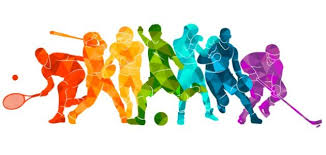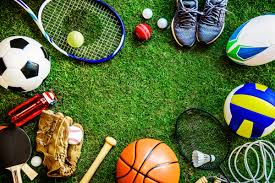Sport is an ordinary physical effort or skill that is practiced according to agreed-upon rules with the aim of entertainment, competition, pleasure, excellence, developing skills, or strengthening self-confidence or body. The difference in goals in terms of their combination or individuality distinguishes sports, in addition to the impact that players or teams add to their sports.
Physical education is the integrated aspect of education that works on developing the individual and adapting him physically, mentally, socially and emotionally through selected physical activities that are appropriate to the stage of development, and which are practiced under the supervision of a good leadership to achieve the highest human values. Just physical health, physical culture, exercise, physical training, or sports, it is one of the fields of comprehensive education, of which physical education constitutes a living field, pointing out that its programs are not just exercises performed, but under the supervision of qualified leadership that helps make human life more appropriate to the requirements of his time.
Egyptian antiquities indicate that the ancient Egyptians practiced various types of sports, including wrestling and dancing, and there is no doubt that sport has proven itself as an important factor in training warriors. In many of the paintings, there are pictures of the pharaohs of Egypt practicing hunting lions and deer with a bow while riding their war chariots.
The effects of the Greek era, such as the Olympic stadium in Greece, indicate that many sports were organizing competitions for participants from among the Greek countries. Many sports were inspired by the activities of Neanderthals, such as:
Chasing prey for a living was inspired by the sport of running and archery.
Jumping to overcome natural disasters, and the sport of jumping was inspired by it.
Swimming in the sea, fishing, and the sport of swimming was inspired by it.
The use of horses for transportation, and the sport of horse racing was inspired by them.
There are also sports that were practiced by the Chinese thousands of years ago, where they used to play soccer with iron.
Practicing most sports adds beauty to the body, such as gymnastics, body building, yoga, equestrian, and also performance such as jumping high, as it is of formal beauty, and preserves the body. And whoever practices sports, he does not need to lose weight, because sports consume everything that exceeds his calories
Sport plays an essential role in any diet that can be followed. They are beneficial to the human body and lead to a reduction in the incidence of diabetes and heart and arterial diseases. They maintain an ideal weight and a better memory. They also increase self-confidence. Where a British study proved that exercise helps the brain to secrete chemicals such as endorphins that make a person feel better. There are also many exciting sports such as football, high jumping and obstacle racing.
And to exercise, you don’t need to spend hours in the gym, all you need is to add a little movement to your daily routine. Recent studies have proven that physical exercise benefits the body a lot and leads to:
Reducing the incidence of diabetes. Better blood sugar control . Reducing the incidence of heart disease, arteries and cholesterol. Weight maintenance. Reducing the incidence of cold better memory. Better sleep. Preserving the joints. Increased self-confidence. Better control of stress and tension
Exercise helps endurance and patience by training the body to be more flexible, and here we explore that sports teaches the following:
Patience, as when an athlete loses in a match, he must be patient with his loss and not transgress against his opponent and seek to win with honor and integrity.
Sport is related to respect, as the athlete must respect the rules of the game and respect his opponent.
Sport teaches the individual fair competition and challenge.
Cooperation and the development of team spirit and teamwork, and this is when holding matches between two or several teams.
As well as learning daring and courage, and this is what is often found in combat sports such as kung fu, karate, etc.
Sport develops self-confidence in the individual, and teaches him to focus.
and many other values that help him adapt in society; Because sport – as mentioned previously – is not to score cups, but to refine souls.
There is a British study that says that doctors are increasingly prescribing exercise as a treatment for those with some diseases, and the study conducted by the Mental Health Foundation, which included 200 doctors who fall under the category of general practitioners, stated that 22 percent of them prescribe exercise to those who suffer from moderate depression. .
Only 5 percent of doctors were prescribing exercise for moderate depression 3 years ago.
The foundation said it is important that doctors do not focus on prescribing antidepressants, given that there are other means.
The research said that exercise helps those with moderate depression because it raises their self-esteem by improving their body image or achieving their goals.
Exercise also helps the brain release chemicals such as endorphins that make a person feel better.
“Exercise can help people physically, socially and biologically,” says Celia Richardson, director of the Mental Health Foundation.
The study found that the number of physicians who believe in the benefits of exercise therapy has increased significantly. Three years ago, only 41 percent believed that exercise was an “effective or very effective” treatment, compared to 61 percent now.
Andrew McCullough, executive director of the Mental Health Foundation, said: “Depression is a complex disease, so treatment needs to be varied and patients given the opportunity to choose.” Sports are active blood circulation to the body.
Sport protects the body from various diseases such as obesity, osteoporosis, heart disease and arteries, as a healthy mind resides in a healthy body.
For his part, Professor Steve Field, from the Royal College of General Practitioners, said, “There is currently awareness among doctors of the benefits of exercise, and there is increasing evidence of its effectiveness, and the response from patients confirms its great benefits.”



